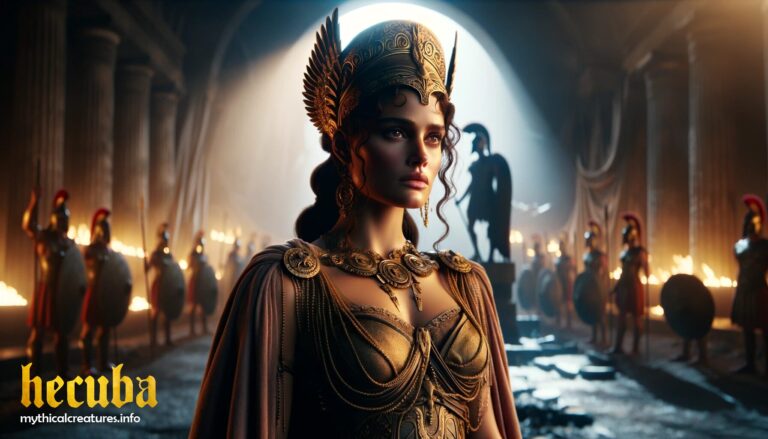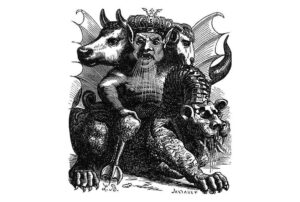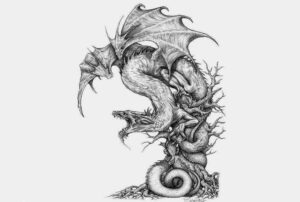Table of Contents
Who Is Hecuba?
Hecuba also known as Hekabe, is a figure in Greek mythology, best known as the queen of Troy and the wife of King Priam. She plays a prominent role in various myths, particularly those associated with the Trojan War. Hecuba is also the mother of many notable Trojan characters, including Hector, Paris, Cassandra, and Polyxena.
Origin
Family
Husband. King Priam, the ruler of Troy, married Hecuba, making her the queen of Troy. Priam, renowned for his wealth and the fathering of many children, solidified Hecuba’s royal status.
Children. Hecuba and Priam had a large and notable family, including:
- Hector: The eldest son and a courageous Trojan warrior.
- Paris: Notorious for his role in the abduction of Helen, which triggered the Trojan War.
- Cassandra: Gifted with the ability to foresee the future, but cursed never to be believed.
- Polyxena: Another daughter, often mentioned in connection with the fall of Troy.
- Troilus: A younger son, known for his tragic love story with Cressida.
Brothers and Sisters. Hecuba’s family background is less detailed in the myths. Her parents were King Dymas and Queen Eunoe. While her siblings are not as prominently featured, she is sometimes mentioned to have a brother named Glaucus.
Hecuba’s family played a central role in the events of the Trojan War and its aftermath, with each member contributing to the complex and tragic narrative of this legendary conflict in Greek mythology.
History
The story of Hecuba takes place before, during, and after the Trojan War, and includes a number of battles and encounters with the gods.
Omens of Destruction
Hecuba’s pregnancy with Paris proved restless and culminated in a prophetic dream. Instead of birthing a normal baby, she dreamt of delivering a fiery torch covered in snakes. Seeking Troy’s prophets for interpretation, they revealed a troubling omen. The prophecy foresaw that if her child lived, he would cause Troy’s fall. Unable to bear this news, as Paris was born, Hecuba ordered two servants to kill him. Unable to carry out the act, they left Paris on a mountain, expecting wild beasts to take him.
However, a shepherd found and raised Paris as his own. Years later, Paris returned, triggering the Trojan War by stealing Helen from Sparta. The oath to defend Helen led to the war, resulting in Troy’s siege, burning, and fulfillment of the prophecy in ruin and flame.
Hector’s Doom
Hecuba actively participated in the Trojan War, receiving advice from her son Hector upon his return to the city. She offered him the libation cup, urging him to make an offering to Zeus and to drink from it himself. Hector, in turn, advised his mother to negotiate with Athena, proposing the offering of a gown from Alexander’s treasure in exchange for divine assistance. The gown, adorned with exquisite embroidery, glittered like a star. It had been brought from Sidon during Alexander’s sea voyage and crafted by Sidonian women.
Despite Hecuba’s efforts, the pleas went unanswered. In a final attempt, she implored Hector not to confront Achilles, but he dismissed her concerns. That evening, Hector dueled with Achilles and met his demise. Learning of Priam’s plan to retrieve Hector’s body, Hecuba grew anxious at the prospect of losing both husband and son on the same day. In a poignant speech, she lamented Hector’s death, as he was the dearest of all her children.
Apollo and Troilus
Later, Hecuba bore a child with Apollo, and a new prophecy emerged: if Troilus lived until he turned 20, Troy would be spared, contradicting the earlier prediction. However, Achilles lay in wait as Troilus rode near a well at the city’s front. Seeking refuge in the temple of Apollo, Troilus met his demise at the altar, dragged by his own horses. This event sealed the city’s fate, fulfilling the ominous prophecy and ensuring its doom and ruin.
Slavery to Odysseus
Enduring numerous trials, Hecuba faced further hardships as she was captured and enslaved by Odysseus. Preceding the Trojan War, she had sought King Polymestor’s protection for her son Polydorus during Odysseus’s journey through Thrace. However, upon reaching the Thracian Chersonese on their return, Hecuba discovered Polymestor’s betrayal – he had killed Polydorus. Witnessing her son’s lifeless body, she went mad and, in a fit of rage, gouged out Polymestor’s eyes and killed his sons. As Odysseus intervened, the gods transformed her into a dog for escape. Hecuba vanished until her death, when she threw herself into the sea. Her tomb, situated on a rocky outcrop in the Hellespont between Greece and Turkey, became a significant landmark for sailors.
FAQ
What is Hecuba's role in the Trojan War?
Hecuba plays a tragic role as the mother of several key figures, including Hector and Paris, and witnesses the fall of Troy.
How is Hecuba portrayed in literature?
Hecuba is depicted as a grieving mother in works like Homer's "Iliad" and Euripides' plays, emphasizing her tragic experiences.
What happens to Hecuba after the fall of Troy?
After Troy's fall, Hecuba becomes a captive, endures suffering, and witnesses the deaths of her children.
How does Hecuba impact Western literature and drama?
Hecuba's character has had a lasting impact on Western literature and drama, inspiring various interpretations and reimaginings.
Who are Hecuba's notable children?
Hecuba is the mother of Hector, Paris, Cassandra, and others, each playing significant roles in the mythological narrative.
What is Hecuba's tragic fate?
Hecuba's fate is marked by tragedy, including the loss of her sons, captivity, and enduring immense suffering.
How does Hecuba connect to Greek epics?
Hecuba is mentioned in Homer's "Iliad" and the "Odyssey," providing insight into her role during and after the Trojan War.
Is Hecuba associated with any prophecies?
Yes, Hecuba encounters prophecies, including those predicting the tragic outcomes for her children and the fall of Troy.
What is Hecuba's impact on maritime landmarks?
Hecuba's tomb on a rocky outcrop in the Hellespont, between Greece and Turkey, becomes an important landmark for sailors.





